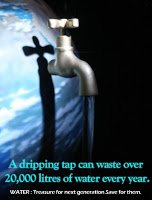Some refrigerators, air conditioners and ice-makers are cooled with wasted flows of water. Consider upgrading with air-cooled appliances for significant water savings.
· Adjust sprinklers so only your lawn is watered and not the house, sidewalk, or street.
· Run your clothes washer and dishwasher only when they are full. You can save up to 1,000 gallons a month.
· Use the garbage disposal sparingly. Compost vegetable food waste instead and save gallons every time.
· Plant in the fall when conditions are cooler and rainfall is more plentiful.
· Monitor your water bill for unusually high use. Your bill and water meter are tools that can help you discover leaks.
· Water your lawn and garden in the morning or evening when temperatures are cooler to minimize evaporation.
· Wash your fruits and vegetables in a pan of water instead of running water from the tap.
· Spreading a layer of organic mulch around plants retains moisture and saves water, time and money.
· Use a broom instead of a hose to clean your driveway and sidewalk and save water every time.
· Collect the water you use for rinsing fruits and vegetables, then reuse it to water houseplants.
· Shorten your shower by a minute or two and you'll save up to 150 gallons per month.Collect water from your roof to water your garden.
· Designate one glass for your drinking water each day or refill a water bottle. This will cut down on the number of glasses to wash.
· When doing laundry, match the water level to the size of the load.
· Soak pots and pans instead of letting the water run while you scrape them clean.· Avoid extra flushes in the toilets.
· Do not water the plants between 11 am to 4 pm, as the water will evaporate.
· Plant native or drought-tolerant plants. Group plants based on water needs.
Dont waste water just because someone else is paying, such as in hotels and Do 1 thing Every day that saves water. Encourage your friends, neighbours and co-workers to do their part.
